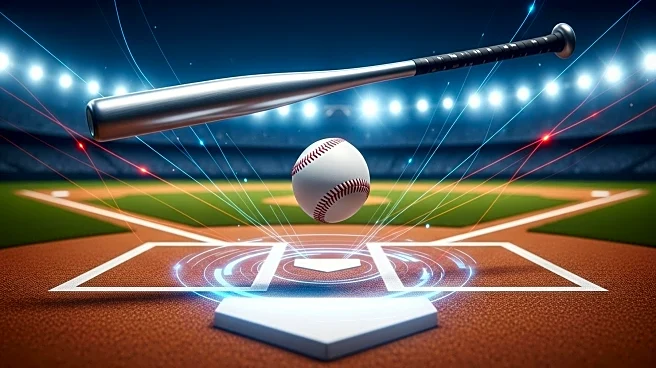What's Happening?
During a recent playoff game between the Cubs and Padres, a controversial strike call against Xander Bogaerts has sparked discussions about the upcoming Automated Ball-Strike (ABS) system. The pitch, thrown by Keller, was called a strike by umpire D.J. Reyburn, despite appearing below the strike zone on the broadcast's strike-zone box. The ABS system, set to be implemented in 2026, would allow challenges to such calls, potentially overturning them based on precise measurements of the strike zone tailored to each player's height. The pitch in question was plotted to be below Bogaerts' personalized strike zone, indicating it should have been called a ball.
Why It's Important?
The introduction of the ABS system in MLB is significant as it aims to enhance the accuracy of strike calls, reducing human error and potential bias. This system could impact game outcomes, player statistics, and team strategies, as it provides a more objective measure of the strike zone. For players like Bogaerts, it offers a chance to challenge calls that could affect their performance and career statistics. The system's implementation reflects MLB's commitment to integrating technology for fairer gameplay, potentially influencing how games are officiated and perceived by fans.
What's Next?
With the ABS system set to debut in 2026, teams and players will need to adapt to the new challenge mechanism. Umpires may face scrutiny as their calls can be contested, altering the dynamics of game management. MLB might revise its rulebook to align with the ABS system, ensuring consistency in strike zone definitions. As teams prepare for this change, they may invest in training and technology to better understand and leverage the system, potentially influencing player recruitment and game strategies.
Beyond the Headlines
The ABS system raises ethical questions about the role of technology in sports and the balance between human judgment and machine precision. It could lead to debates on the authenticity of the game and the potential loss of traditional umpiring skills. Additionally, the system might influence cultural perceptions of baseball, as fans and players adjust to a new era of tech-driven officiating.









